About Muscat
Discover the essence of Muscat through our comprehensive section solely dedicated to providing valuable information about the capital city of Oman. From its rich history and iconic landmarks to cultural experiences, outdoor adventures, and practical tips, our curated content offers a deep dive into the unique offerings of Muscat.
Jump to:
ABOUT MUSCAT
History of Muscat
The history of Muscat stretches back over two millennia, and the city's strategic location on the Arabian Sea coast has played a pivotal role in shaping its rich and diverse past. From ancient settlements to the rise of influential dynasties and colonial encounters, Muscat's historical journey reflects the fascinating tapestry of Oman's heritage.
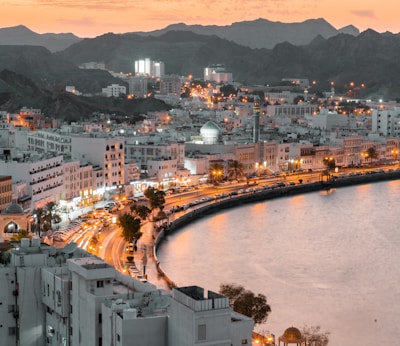
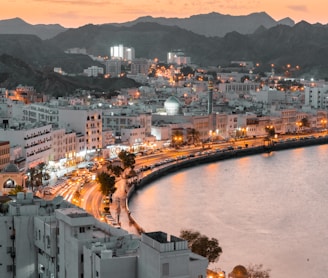
Evidence of human settlement in the Muscat area dates back to the pre-Islamic period, with archaeological findings revealing ancient tombs and artifacts. Muscat served as a significant trading port along the Maritime Silk Road, connecting the Arabian Peninsula with India, Persia, and East Africa. The city's thriving maritime trade and strategic location contributed to its early prominence.
Throughout history, Muscat was ruled by various Omani dynasties, each leaving its mark on the city's development. One of the most notable dynasties was the Al Said dynasty, which emerged in the 18th century and continues to rule Oman to this day. Muscat's strategic location on the Gulf of Oman and the Arabian Sea played a crucial role in the rise of Omani maritime power.
In the 16th century, Muscat fell under the control of the Portuguese, who sought to dominate the Indian Ocean trade routes. During this period, the Portuguese constructed forts, including Al Jalali and Al Mirani, to protect their interests and control the region. However, the Portuguese occupation was met with resistance from Omani forces, eventually leading to their expulsion in the 17th century.
In the 18th century, Muscat entered a golden era of prosperity under the leadership of the Al Bu Said dynasty. The most renowned ruler of this dynasty was Sultan Said bin Sultan Al Said, who modernized the city and fostered economic and cultural development. His legacy continues through his descendants, including Sultan Qaboos bin Said Al Said, who played a transformative role in shaping modern Oman and Muscat.
Throughout its history, Muscat has been known for its non-aligned foreign policy and diplomatic neutrality. The country has maintained friendly relations with various nations, fostering cooperation and engagement in international affairs without getting entangled in regional conflicts. This diplomatic approach has earned Muscat respect and recognition on the global stage.
Under Sultan Qaboos bin Said Al Said's leadership, Oman, including Muscat, witnessed rapid modernization and development. The Sultan's vision and dedication led to significant infrastructural advancements, improved education, and enhanced healthcare services, elevating Oman's status as a progressive nation while preserving its cultural heritage.
The history of Muscat is a captivating tale of ancient maritime trade, the rise and fall of dynasties, encounters with foreign powers, and the vision of its dynamic rulers. Today, Muscat stands as a modern city that embraces its cultural heritage and values diplomatic relations, making it a vibrant destination where the echoes of the past harmoniously resonate with the aspirations of the present. As visitors explore the city's historical landmarks and engage with its welcoming populace, they become part of Muscat's living history, connecting with the legacy that has shaped this extraordinary capital city of Oman
ABOUT MUSCAT
Politics of Oman and Muscat
As the capital city of Oman, Muscat serves as the political center of the country's governance and administration. Oman is a unique nation in the Middle East, known for its stable political environment and balanced foreign policy. Understanding the political landscape of Muscat and Oman offers insight into the nation's governance, diplomatic relations, and its role in regional and global affairs.
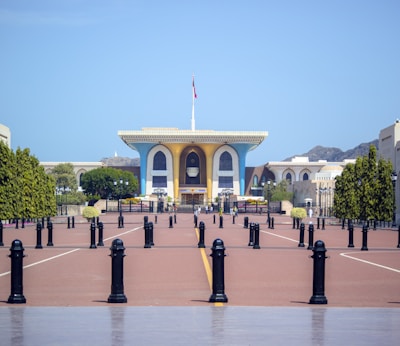
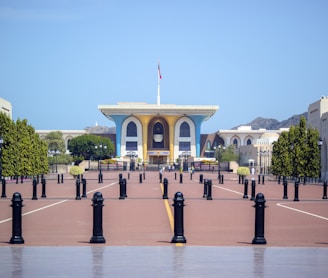
Oman is a hereditary absolute monarchy, and the Sultanate of Oman is the official title of the country's government. The Sultan holds significant executive power and serves as the head of state and government. As of my last knowledge update in September 2021, Sultan Haitham bin Tariq Al Said assumed the throne in January 2020, succeeding the late Sultan Qaboos bin Said Al Said, who ruled Oman for nearly 50 years.
Oman's governance is guided by the Basic Law of the State, a constitution-like document that was promulgated in 1996. The Basic Law outlines the system of governance, the roles of different institutions, and the rights and duties of citizens. It ensures the rule of law, the protection of fundamental freedoms, and the establishment of a just and inclusive society.
Oman's Consultative Assembly, known as the Majlis Ash-Shura, plays a vital role in the country's political structure. The Majlis Ash-Shura is an advisory body that consists of elected members who represent different regions of the country. It is responsible for reviewing and proposing legislation and policies and advising the Sultan on matters related to the country's development.
Oman is often regarded as one of the most politically stable countries in the Middle East. The Sultanate has managed to avoid major internal and external conflicts and has maintained a policy of neutrality in regional disputes. The political stability of Muscat and Oman has been conducive to economic growth, attracting foreign investment and fostering a favorable business environment.
Oman is known for its non-aligned foreign policy, pursuing an independent and neutral stance in regional and global affairs. The country has engaged in diplomatic efforts to foster dialogue and mediation in conflicts, earning respect as a trusted mediator among international counterparts. Muscat's diplomatic initiatives have focused on promoting regional stability, counterterrorism, and peaceful resolutions to disputes.
As the capital city of Oman, Muscat plays a central role in the nation's regional and global diplomacy. Oman maintains friendly relations with countries across the world and has established itself as a mediator in regional conflicts. Muscat has hosted numerous high-profile diplomatic events and meetings, contributing to its reputation as a diplomatic hub in the Gulf region.
The politics of Muscat and Oman reflect a stable and neutral approach to governance and diplomacy. The country's hereditary absolute monarchy, guided by the Basic Law, has ensured a peaceful and inclusive society. Muscat's diplomatic initiatives have earned the nation a respected role in regional affairs, and its balanced foreign policy has contributed to its image as a reliable and trusted partner on the global stage. Understanding the political dynamics of Muscat and Oman provides valuable context to visitors, showcasing a nation that values stability, diplomacy, and progress.
ABOUT MUSCAT
Neighbourhoods and Districts
Muscat, the capital city of Oman, is a sprawling metropolis that encompasses several vibrant neighborhoods and districts, each offering a unique blend of history, culture, and modernity. From the bustling streets of the Old Town to the contemporary developments of the newer districts, exploring Muscat's diverse neighborhoods provides an enriching experience that showcases the city's multifaceted character.
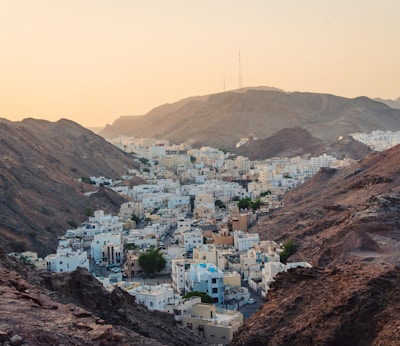
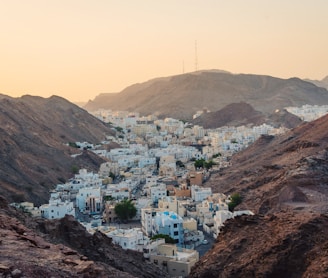
Mutrah
Nestled along the shores of the Gulf of Oman, Mutrah is one of Muscat's oldest and most iconic neighborhoods. The historic Mutrah Corniche, with its traditional wooden dhows moored along the harbor, presents a picturesque waterfront promenade. Visitors can immerse themselves in the lively atmosphere of the Mutrah Souq, a bustling marketplace offering an array of traditional Omani handicrafts, spices, textiles, and souvenirs.
Located in the heart of Muscat, Ruwi is the city's bustling commercial and financial district. This vibrant area is home to numerous businesses, banks, government offices, and shopping centers. Visitors can explore the bustling streets, dine at various eateries, and shop for everything from electronics to traditional Omani goods.
Ruwi
Muscat's neighborhoods and districts are a reflection of the city's diversity, offering a blend of history, modernity, and cultural richness. From the traditional charm of Mutrah to the contemporary allure of Al Qurum, each neighborhood presents a unique facet of Muscat's character. Whether strolling through historic alleys, enjoying the seaside ambiance, or experiencing the urban vibrancy, exploring Muscat's diverse neighborhoods is an essential part of discovering the soul of this captivating city.
Al Qurum is a modern and upscale neighborhood in Muscat, known for its pristine Qurum Beach and scenic Qurum Park. This popular district offers a range of upscale hotels, restaurants, and shopping options. Al Qurum provides a serene escape for beach lovers and families seeking recreational activities in a tranquil setting.
Al Qurum
Al Ghubrah
Al Ghubrah is a lively residential area in Muscat, boasting a mix of residential properties, schools, and shopping centers. The Oman Convention and Exhibition Center, one of the city's major event venues, is also located in this district. Al Ghubrah provides visitors with a glimpse into the everyday life of Muscat's residents.
Situated close to Muscat International Airport, Al Azaiba is a diverse neighborhood with a mix of residential, commercial, and entertainment options. The Grand Mall Muscat, one of the city's prominent shopping destinations, is located in this district. Visitors can experience a vibrant community with various dining choices and recreational facilities.
Al Azaiba
Known for its bustling streets and wide range of dining and entertainment options, Al Khuwair is a lively neighborhood in Muscat. The Sultan Qaboos Sports Complex and the Oman Avenues Mall are prominent landmarks in this area. Al Khuwair offers a vibrant ambiance, making it a favorite spot for locals and tourists alike.
Al Khuwair
Qurum Heights
Perched on the cliffs overlooking the Gulf of Oman, Qurum Heights is a residential neighborhood that provides stunning views of the sea. Visitors can explore the Royal Opera House Muscat, a splendid architectural gem that hosts world-class performances. Qurum Heights offers a tranquil retreat amidst scenic surroundings.
Bousher Heights
Bousher Heights is a picturesque residential neighborhood nestled in the heart of Muscat, Oman. Offering stunning views of the surrounding mountains and the city below, this tranquil area provides a peaceful escape from the urban bustle. Bousher Heights is a sought-after locale for both residents and visitors seeking a serene living environment in Muscat.
ABOUT MUSCAT
Landmarks and Attractions
Muscat, the captivating capital city of Oman, boasts a rich tapestry of landmarks and attractions that reflect its historical significance, cultural heritage, and modern development. From splendid architectural marvels to ancient forts, bustling souqs, and scenic waterfronts, Muscat's array of attractions offers visitors a journey through time and a glimpse into the soul of the city.
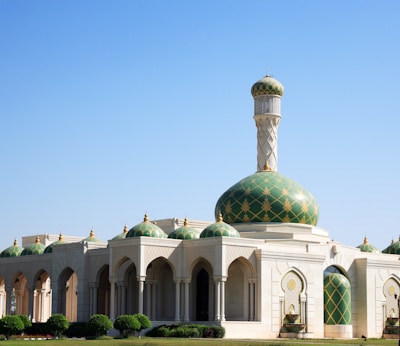
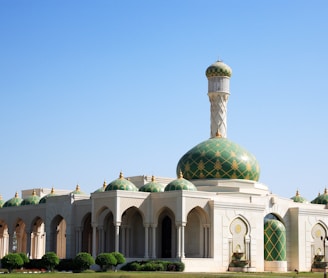
Sultan Qaboos Grand Mosque
A true masterpiece of Islamic architecture, the Sultan Qaboos Grand Mosque stands as an iconic landmark in Muscat. With its grand prayer hall, stunning chandeliers, and intricately designed domes, the mosque exudes elegance and spiritual splendor. Open to non-Muslim visitors, the mosque welcomes guests to appreciate its awe-inspiring beauty and serene ambiance.
Perched dramatically on opposite sides of the entrance to Muscat's old harbor, Al Jalali and Al Mirani forts are historic bastions that once guarded the city against invasions. Today, these forts stand as enduring symbols of Muscat's defensive past and provide breathtaking views of the sea and the city.
Al Jalali and Al Mirani Forts
Stroll along the picturesque Mutrah Corniche, a scenic waterfront promenade that offers sweeping views of the Gulf of Oman. Adjacent to the Corniche lies the renowned Mutrah Souq, a bustling marketplace with labyrinthine alleys filled with the aroma of frankincense and a vibrant array of goods, including textiles, jewelry, and Omani handicrafts.
Mutrah Corniche and Souq
The Al Alam Palace, also known as the Sultan's Palace, is an enchanting royal residence flanked by the historic forts of Mirani and Jalali. With its striking golden and blue facade, the palace stands as a testament to Oman's contemporary architecture and showcases the Sultanate's rich cultural heritage.
Al Alam Palace
A cultural gem in the heart of the city, the Royal Opera House Muscat is a stunning venue that hosts world-class performances, from operas and ballets to concerts and theatrical productions. Its magnificent architecture and world-class facilities make it a significant cultural and artistic hub in Oman.
Royal Opera House
Escape the urban hustle at Qurum Natural Park, a serene oasis in the heart of the city. The park features beautifully landscaped gardens, tranquil ponds, and walking paths, providing a relaxing space for leisure activities and family picnics.
Qurum Natural Park
Delve into Oman's cultural heritage at the Bait Al Zubair Museum, which houses a captivating collection of traditional Omani artifacts, including costumes, weaponry, and historical documents. The museum offers insights into the nation's history, customs, and lifestyle.
Bait Al Zubair Museum
For nature enthusiasts, the Daymaniat Islands, located a short boat ride from Muscat, offer an underwater paradise for snorkeling and diving. The islands are home to diverse marine life and vibrant coral reefs, making them a haven for underwater exploration and adventure.
Daymaniat Islands
ABOUT MUSCAT
Shopping and Souqs
Muscat, the bustling capital city of Oman, offers a delightful shopping experience with a mix of modern shopping centers and traditional souqs. From bustling marketplaces brimming with exotic goods to contemporary malls housing international brands, Muscat's shopping destinations cater to diverse tastes and preferences, making it a shopaholic's paradise.
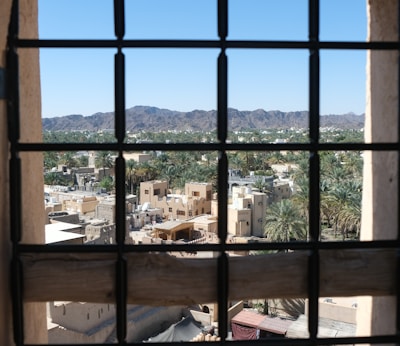
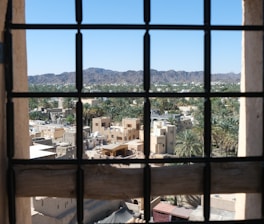
Mutrah Souq
One of Muscat's oldest and most iconic souqs, Mutrah Souq is a vibrant marketplace that showcases the essence of Omani culture and heritage. Nestled in the heart of Mutrah, this traditional souq welcomes visitors with its labyrinthine alleys, adorned with colorful textiles, intricate jewelry, handcrafted pottery, and aromatic spices, including the famous Omani frankincense.
Located in Al Khuwair, the Muscat Grand Mall is a modern shopping destination that caters to fashion enthusiasts and families alike. The mall houses a wide array of international and regional brands, boutiques, and specialty stores. Visitors can explore the latest fashion trends, find souvenirs, enjoy entertainment options, and indulge in a variety of culinary delights at the food court.
Muscat Grand Mall
Al Muzn Mall, situated in Al Ghubrah, offers a contemporary shopping experience with an array of retail stores, entertainment venues, and dining options. This mall caters to shoppers seeking a mix of popular global brands and local specialties, making it a one-stop destination for leisure and retail therapy.
Al Muzn Mall
Known for its local charm and vibrant atmosphere, Sabco Centre in Al Khuwair is a popular shopping complex where visitors can find an eclectic mix of shops selling everything from traditional garments to electronics, handicrafts, and household items. It's a great place to explore and discover unique finds at affordable prices.
Sabco Centre
Located in Al Ghubrah, Oman Avenues Mall is one of the largest and most modern shopping centers in Muscat. This extensive mall boasts a wide range of retail outlets, including fashion stores, electronics shops, and lifestyle brands. Visitors can also indulge in a diverse range of dining options and entertainment activities.
Oman Avenues Mall
ABOUT MUSCAT
Events and Festivals
Muscat, the cultural heart of Oman, hosts a vibrant calendar of events and festivals that celebrate the nation's rich heritage, artistry, and diversity. Throughout the year, locals and visitors alike are treated to an array of cultural performances, music festivals, and traditional celebrations that showcase the essence of Omani identity and offer a captivating glimpse into the city's lively spirit.
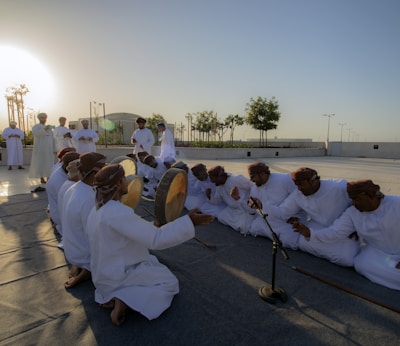
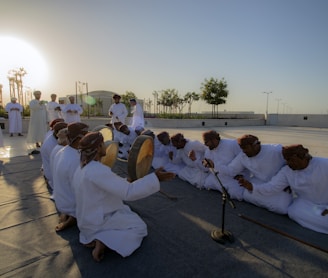
The Muscat Festival is an annual extravaganza that takes place during January and February, attracting visitors from around the world. This grand celebration offers a blend of traditional Omani culture, art exhibitions, music concerts, and a carnival-like atmosphere. From traditional dance performances and folkloric shows to fireworks displays and culinary delights, the Muscat Festival is a true showcase of Omani pride and hospitality.
Oman National Day
Muscat Festival
Celebrated on November 18th each year, Oman National Day is a joyous occasion that commemorates the Sultanate's independence and the modern renaissance led by Sultan Qaboos bin Said Al Said. Muscat comes alive with colorful decorations, cultural displays, and patriotic fervor. Festivities include parades, traditional performances, and a display of Omani flags and symbols throughout the city.
For cinema enthusiasts, the Muscat International Film Festival is a highly anticipated event that celebrates cinematic excellence from around the world. Held annually, the festival screens a diverse selection of international films, including regional productions, documentaries, and short films. It offers a unique opportunity to appreciate the art of storytelling and cinema from different cultures.
Muscat International Film Festival
The Al-Ghaftay Festival is a cherished Omani tradition that takes place in various regions, including Muscat. Celebrated during the cooler months, this festival centers around traditional horse and camel races, showcasing the prowess of local breeders and their prized animals. Visitors can witness exciting races, enjoy cultural performances, and savor traditional Omani dishes.
Al-Ghaftay Festival
For fashion enthusiasts, Muscat Fashion Week is a highlight on the city's events calendar. This fashion extravaganza brings together local and international designers, models, and fashionistas to showcase the latest trends and designs. The event features runway shows, exhibitions, and workshops, creating a platform to celebrate creativity and style.
Muscat Fashion Week
Various religious festivals are celebrated in Muscat, reflecting Oman's diverse faith traditions. These festivals, such as Eid Al-Fitr and Eid Al-Adha, mark important occasions on the Islamic calendar and are observed with prayer, feasting, and charity. Visitors can experience the warm hospitality and unity as families and communities come together to celebrate these auspicious occasions.
Religious Festivals
From cultural extravaganzas like the Muscat Festival to the solemnity of religious observances, Muscat's events and festivals offer a fascinating insight into the city's rich tapestry of traditions, creativity, and unity. Whether it's experiencing the pageantry of Oman National Day, exploring the world of cinema at the Muscat International Film Festival, or savoring the excitement of fashion at Muscat Fashion Week, the city's lively calendar of events promises unforgettable experiences that celebrate the soul of Oman's capital.

